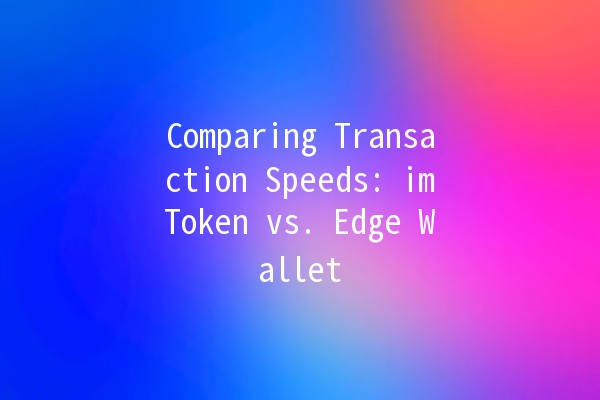In the rapidly evolving world of cryptocurrencies, users increasingly rely on digital wallets to manage their assets. Among the numerous wallets available, imToken and Edge Wallet stand out for their distinct features and functionality. This article thoroughly examines the transaction speeds of imToken and Edge Wallet, providing valuable insights for users on making an informed decision.
Before diving into a comparison of imToken and Edge Wallet, let’s explore what transaction speed means in the context of cryptocurrency wallets. Transaction speed refers to the time it takes for a transaction to be confirmed on a blockchain. This factor is crucial for users looking to make timely transactions, especially in a market known for its volatility.
Higher transaction speeds enhance user experience, facilitate quick trades, and reduce the likelihood of losses. Therefore, understanding the transaction speeds of your preferred wallet is paramount.
imToken is a mobile wallet specifically designed for Ethereum and ERC20 tokens. It offers a userfriendly interface, making it a popular choice for both novice and experienced cryptocurrency users.

Edge Wallet is a versatile cryptocurrency wallet that supports various cryptocurrencies, offering features like instant buy/sell and builtin exchange capabilities. Its focus on user privacy and security sets it apart from many wallets.
imToken: 1030 seconds under normal conditions (dependent on Ethereum network congestion).
Edge Wallet: Typically confirms transactions under 10 minutes but varies with blockchain chosen.
When users engaged in quick trading sessions among cryptocurrencies, imToken provided a more favorable experience for Ethereumbased transactions. Edge Wallet, while more accommodating to a variety of cryptocurrencies, presented slower speeds due to the diversified networks.
Both wallets offer robust security measures; however, the transaction speed may vary depending on users’ willingness to adjust security settings (e.g., enabling multisignature for enhanced security could potentially slow down transaction initiation).
Transaction speed can be influenced by network congestion, the cryptocurrency chosen, and userselected fees. Choosing a wallet like imToken during busy times can slow down transactions compared to Edge Wallet’s multichain capabilities.
imToken tends to be more advantageous for transactions involving Ethereum and ERC20 tokens due to its direct connection with the Ethereum network.
To improve transaction speed, consider adjusting the gas fees, avoiding peak transaction times, and keeping the wallet app updated to leverage any performance enhancements.
No, transaction speeds in Edge Wallet vary depending on the blockchain of the cryptocurrency being used. For example, Bitcoin transfers may naturally take longer than Ethereum transactions.
Yes, both wallets allow internal exchanges. This action can affect the overall time depending on the chosen currencies and network conditions.
Not necessarily. Both imToken and Edge Wallet prioritize security, but faster transactions sometimes require higher fees or adjustments that could impact user security preferences.
When it comes down to imToken versus Edge Wallet regarding transaction speed, both wallets offer unique advantages depending on the user’s needs and cryptocurrency preferences. imToken shines in Ethereum transactions, providing swift confirmations, while Edge Wallet offers flexibility across several blockchains. Users must weigh their specific requirements — such as which cryptocurrencies they predominantly use, their urgency in transactions, and their inclination towards either a singular or multicurrency wallet.
In terms of enhancing transaction speeds, users should familiarize themselves with the settings and features of their chosen wallet to optimize their experience effectively. Whether you prefer imToken or Edge Wallet, understanding the mechanics of transaction speed will empower your cryptocurrency dealings, ultimately leading to enhanced user satisfaction.